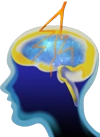Alzheimer Disease treatment in Mumbai
Alzheimer’s Disease
Alzheimer’s disease (AD), also referred to simply as Alzheimer, is a progressive brain disorder and the most prevalent form of dementia. Individuals with AD experience increasing and recurring memory loss. Over time, they may become socially withdrawn and face difficulties with thinking, planning, working, interacting with others, and self-care.
Alzheimer’s disease is the most prevalent type of dementia, accounting for over 60% of diagnoses globally, and is the most frequent form of early onset dementia, accounting for approximately one-third of all dementia patients under the age of 65.
People with Down syndrome and other learning difficulties are more likely to acquire dementia at a young age. Alzheimer’s disease is the most common cause of dementia among persons with Down syndrome.
Understanding Alzheimer’s and dementia
Alzheimer’s is the leading cause of dementia, a general term used to describe memory loss and other cognitive impairments significant enough to disrupt daily activities. Alzheimer’s disease is responsible for 60-80% of dementia cases. It is important to note that Alzheimer’s is not a typical aspect of aging.
The most significant known risk factor is advancing age, with the majority of Alzheimer’s patients being 65 years or older. When Alzheimer’s affects individuals under 65, it is referred to as younger-onset or early-onset Alzheimer’s. People with younger-onset Alzheimer’s can be in any stage of the disease: early, middle, or late.
Symptoms of Alzheimer’s
Just like the rest of our bodies, our brains undergo changes as we age. Many of us will notice slower thinking and occasional difficulty remembering certain things. However, significant memory loss, confusion, and other substantial cognitive changes could indicate that brain cells are failing.
Alzheimer’s typically starts in the brain region responsible for learning. As the disease progresses, it causes increasingly severe symptoms, such as disorientation, mood and behavior changes, profound confusion about events, time, and place, baseless suspicions about loved ones and caregivers, worsening memory loss, behavioral changes, and difficulties with speaking, swallowing, and walking.
Individuals experiencing memory loss or other potential signs of Alzheimer’s may not recognize the problem. Family members or friends are often the first to notice signs of dementia. If you or someone you know is exhibiting symptoms of dementia, it’s crucial to consult a doctor as soon as possible.
Don’t wait— schedule a consultation today to get the help and support you need.
How does Alzheimer’s Disease progress?
👉🏻 Early-stage Alzheimer’s (mild):
During the early stage of Alzheimer’s, individuals can often function independently. Although symptoms might not be obvious to everyone, close family and friends may notice changes. A doctor can diagnose these symptoms using specific tools.
- Common challenges include:
- Struggling to find the right word or name.
- Difficulty remembering names of new acquaintances.
- Trouble completing tasks in social or work environments.
- Forgetting recently read information.
- Misplacing or losing valuable items.
- Increased difficulty with planning and organizing.
👉🏻 Middle-stage Alzheimer’s (moderate):
The middle stage is usually the longest and can span several years. As the disease advances, individuals with Alzheimer’s will need more care.
Symptoms, which can differ among individuals, may include:
- Forgetfulness of personal events or history.
- Moodiness or withdrawal, especially in socially or mentally demanding situations.
- Inability to recall personal information, such as address, phone number, or schools attended.
- Confusion about time and place.
- Needing help selecting appropriate clothing for the season or occasion.
- Difficulty controlling bladder and bowel functions.
- Changes in sleep patterns, such as daytime sleeping and nighttime restlessness.
- Increased tendency to wander and get lost.
- Personality and behavioral changes, including suspicion, delusions, or compulsive, repetitive behaviors like hand-wringing or tissue shredding.
👉🏻 Late-stage Alzheimer’s (severe):
In the final stage, dementia symptoms become severe. Individuals lose the ability to respond to their environment, engage in conversation, and control movement.
- At this stage, individuals may:
- Require 24/7 assistance with daily personal care.
- Lose awareness of recent experiences and surroundings.
- Experience significant changes in physical abilities, such as walking, sitting, and swallowing.
- Have difficulty communicating.
- Be highly susceptible to infections, particularly pneumonia.
👉🏻 Now is the Best Time to Talk about Alzheimer’s Together
Early detection of Alzheimer’s or other dementia offers significant benefits for the person diagnosed and their loved ones. If you or your family notice changes, it could be Alzheimer’s.
If you are looking for Alzheimer treatment in Mumbai, consulting with a specialist can provide the appropriate care and support needed to manage the condition effectively.
FAQs
1. What are the early signs of Alzheimer’s disease?
Early signs of Alzheimer’s include memory loss, difficulty finding words, trouble completing familiar tasks, confusion about time or place, and changes in mood or behavior.
2. How is Alzheimer’s diagnosed?
Alzheimer’s is diagnosed through a combination of medical history, physical exams, neurological tests, and cognitive assessments. Imaging tests like MRI or CT scans may also be used to rule out other conditions.
3. What treatment options are available for Alzheimer’s in Mumbai?
Treatment options for Alzheimer’s in Mumbai include medications to manage symptoms, cognitive therapies, lifestyle changes, and support from healthcare professionals specializing in neurodegenerative diseases.
4. Can lifestyle changes help manage Alzheimer’s symptoms?
Yes, lifestyle changes such as a healthy diet, regular physical activity, mental stimulation, and social engagement can help manage symptoms and improve the quality of life for individuals with Alzheimer’s.
5. How can I support a loved one with Alzheimer’s?
Supporting a loved one with Alzheimer’s involves being patient, creating a safe environment, establishing routines, engaging in memory care activities, and seeking support from healthcare providers and support groups.
For more information & consultation on Alzheimer Disease treatment in Mumbai Call our expert Dr. Amit Shah – Consultant Neurologist in Mumbai on 9819561456 or Book an Appointment

